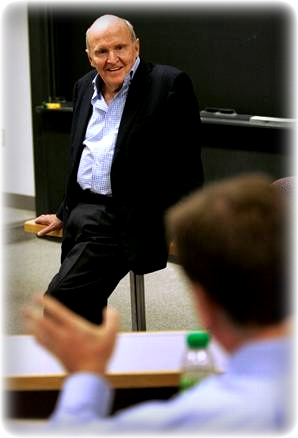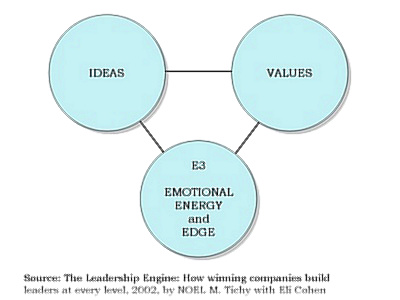반응형

예전에 IBM이 새로운 CEO로 루 거스너를 영입할 때의 일입니다.
당시 루 거스너는 처음 IBM CEO로 임명받고 나서 IBM 내에서 자신을 도와 조직을 혁신하고 새로운 사업을 진행할 적임자를 찾고자 부단히도 노력했지만, 이미 관료화된 조직에서 새롭고 혁신적인 아이디어를 제안하고 실행할 만한 사람들이 거의 전무하다시피 했답니다. 그래서 부득이 외부에서 최고의 인재들을 영입하게 되었고 이런 인재들과 함께 IBM을 밑바닥에서부터 변화시켜 지금의 성공적인 IBM으로 탈바꿈 시켰다고 합니다.
당시 전 세계에서 가장 크고 명성이 자자했던 IBM이 무엇이 문제였을까요?
그건 바로 조직내부에서 역량있는 Leader를 길러내지 못했다는 겁니다.
Leadership Engine 이라는 책에서 Tichy 박사는 어떤 기업이나 조직이 지속적으로 성공을 거두기 위해서는, Leader들이 다음 세대 Leader를 길러내는 것 만이 거의 유일한 길이라고 지적하고 있습니다. 이에 대한 예로 든 것이 바로 잭 웰치가 GE를 혁신한 것을 들었구요.
Jack Welch가 가장 위대한 리더로 존경받는 이유가 바로 다음 세대 리더들을 끊임없이 발굴하고 개발했다는 점입니다. 예를 들어 GE의 Crontonville Center에 격주마다 한 번씩 찾아가서 GE의 차세대 리더가 되고자 하는 교육생들과 끊임없이 토론하고, Coaching하고 또한 그들의 아이디어를 실행할 수 있도록 과감하게 권한을 부여하고 또한 세심하게 평가를 했다는 겁니다.
많은 조직에서 교육이나 인재개발이라고 하면 시간때우기, 아니면 의례 승진하면 받는 지루한 것 이라고 치부되기 일쑤입니다만 "오직 사람만이 차별화된 경쟁력"이라고 굳게 믿었던 Jack Welch는 그 바쁜 와중에도 불구하고 미래세대의 리더들을 길러내기에 혼신을 다했던 것입니다. 그 결과로 GE 자신의 혁신은 물론이거니와 GE 출신의 다수 인재들이 여러 기업들의 CEO나 리더들로 다양하게 진출해서 전세계에 Leader를 공급하는 Pipeline으로 변화하게 되었던 것입니다.
자세한 것은 아래에 책 Summary를 참조하면 되겠습니다만, 마지막으로 이런 말을 남겨놓고 싶습니다.
최고의 Leader가 되고 싶다면, Leader 스스로 최고의 스승이 되어 여러 사람들이 스스로 리더가 되게 하면 됩니다.
J.H.Choi
당시 루 거스너는 처음 IBM CEO로 임명받고 나서 IBM 내에서 자신을 도와 조직을 혁신하고 새로운 사업을 진행할 적임자를 찾고자 부단히도 노력했지만, 이미 관료화된 조직에서 새롭고 혁신적인 아이디어를 제안하고 실행할 만한 사람들이 거의 전무하다시피 했답니다. 그래서 부득이 외부에서 최고의 인재들을 영입하게 되었고 이런 인재들과 함께 IBM을 밑바닥에서부터 변화시켜 지금의 성공적인 IBM으로 탈바꿈 시켰다고 합니다.
당시 전 세계에서 가장 크고 명성이 자자했던 IBM이 무엇이 문제였을까요?
그건 바로 조직내부에서 역량있는 Leader를 길러내지 못했다는 겁니다.
Leadership Engine 이라는 책에서 Tichy 박사는 어떤 기업이나 조직이 지속적으로 성공을 거두기 위해서는, Leader들이 다음 세대 Leader를 길러내는 것 만이 거의 유일한 길이라고 지적하고 있습니다. 이에 대한 예로 든 것이 바로 잭 웰치가 GE를 혁신한 것을 들었구요.
Jack Welch가 가장 위대한 리더로 존경받는 이유가 바로 다음 세대 리더들을 끊임없이 발굴하고 개발했다는 점입니다. 예를 들어 GE의 Crontonville Center에 격주마다 한 번씩 찾아가서 GE의 차세대 리더가 되고자 하는 교육생들과 끊임없이 토론하고, Coaching하고 또한 그들의 아이디어를 실행할 수 있도록 과감하게 권한을 부여하고 또한 세심하게 평가를 했다는 겁니다.
많은 조직에서 교육이나 인재개발이라고 하면 시간때우기, 아니면 의례 승진하면 받는 지루한 것 이라고 치부되기 일쑤입니다만 "오직 사람만이 차별화된 경쟁력"이라고 굳게 믿었던 Jack Welch는 그 바쁜 와중에도 불구하고 미래세대의 리더들을 길러내기에 혼신을 다했던 것입니다. 그 결과로 GE 자신의 혁신은 물론이거니와 GE 출신의 다수 인재들이 여러 기업들의 CEO나 리더들로 다양하게 진출해서 전세계에 Leader를 공급하는 Pipeline으로 변화하게 되었던 것입니다.
자세한 것은 아래에 책 Summary를 참조하면 되겠습니다만, 마지막으로 이런 말을 남겨놓고 싶습니다.
최고의 Leader가 되고 싶다면, Leader 스스로 최고의 스승이 되어 여러 사람들이 스스로 리더가 되게 하면 됩니다.
J.H.Choi
The Leadership Engine: How winning companies build leaders at every level
About the Author: Noel M. Tichy
Noel M. Tichy is a professor at the University of Michigan Business School, director of the school's Global Leadership Partnership, and former head of GE's Crotonville Leadership Development Center. He is the author of the best seller Control Your Destiny or Someone Else Will (with Stratford Sherman).
Noel M. Tichy is a professor at the University of Michigan Business School, director of the school's Global Leadership Partnership, and former head of GE's Crotonville Leadership Development Center. He is the author of the best seller Control Your Destiny or Someone Else Will (with Stratford Sherman).
1. Introduction
Winning Organizations are Teaching Organization
· Leaders with a proven track record of success take direct responsibility for the development of other leaders
· Leaders who develop other leaders have teachable points of view in the specific areas of ideas, values and something that called E-cubed (Emotional Energy and Edge)
· Leaders embody their teachable points of view in living stories
· Winning leaders invest considerable time developing other leaders, so they have well-defined methodologies and coaching and teaching techniques
2. Why are leaders important?
Leaders manage Through Times of Change
· They determine direction
· They move organizations from where they are to where they need to be
Leaders Make Things Happen
· They shape the culture
· They use the management tools
Leaders Are Revolutionaries
· They face reality and mobilize appropriate responses
· They encourage others to do the same
3. Leadership and the Teachable Point of View
Great Leaders Are Great Teachers
· They accomplish their goals through the people they teach
· They teach others to be leaders, not followers
Winning Leaders Make Teaching a Personal Priority
· They consider teaching one of their primary roles
· They use every opportunity to learn and to teach
Winners Have a “Teachable Point of View”
· They have clear ideas and values, based on knowledge and experience
· They articulate those lessons to others
4. Past as Prologue: Learning from Experiences
Winning Leaders Draw from Their Pasts
· Events early in life shape lessons that they use in the future
· They consciously capture these lessons and use them as guides
Leaders’ Stories Reveal Their Teachable Points of View
· Tom Tiller’s grandfather taught him, “You gotta try”
· Fidel Castro taught Roberto Goizueta to take risks
Everyone Has a Usable Past: Leaders Just Use Theirs Better
· Leaders recognize the defining moments in their lives
· They communicate the lessons through words and actions
5. The Heart of Leadership: It Starts with ideas
Winning Organizations Are Built on Clear Ideas
· “Quantum” ideas set a direction for everyone
· “Incremental” ideas are about strategy, structure and implementation
Leaders Make Sure the Ideas Are Current and Appropriate
· “Quantum” ideas set a direction for everyone
· “Incremental” ideas are about strategy, structure and implementation
Ideas Are the Framework for Actions at All Levels
· They provide a context for everyone’s decision making
· They motivate people toward a common goal
6. Values – Speaking with Words and Action
Winning Organizations Have Strong Values
· These values define desirable behaviors
· They support the organization’s central goals
Winning Leaders Live the Values – Privately and Publicly
· Their personal conduct embodies the values
· Their actions reinforce the values in others
Values Are a Key Competitive Tool
· They are the fabric of the corporate culture
· They provide the “instinctive” grounding for smart actions
7. Making It Happen – Getting Energy Out of Everyone
Winning Leaders Are High-Energy People
· They are focused and determined
· They like challenges and enjoy their work
Winning Leaders Create Energy in Others
· They motivate with their enthusiasm and actions
· Stretch goals inspire ambitious effort
Times of Transition = Teachable Moments
· The Leader’s specialty: Turning negative energy to positive uses
· If they don’t have a problem to be fixed, they create one
8. Edge – The Courage to See Reality and Act on it
Winning Leaders Never Take the Easy Way Out
· They fact the hard facts and make the tough calls
· Risk and pain don’t deter them
Categories of Edge
· Portfolio – Pursuing new businesses and abandoning old ones
· People – Promoting risk-takers and confronting failures
Edge Isn’t Cruel, It’s Honest
· Winning leaders pursue the truth and can explain it to others
· Without edge, expedience wins over necessity
9. Trying It All Together – Wiring Your Leadership Story
Winning Leaders Portray the Future as an Unfolding Drama
· They tell stories that engage followers emotionally and rationally
· The stories weave together ideas, values and modes of behavior
Winners’ Stories Create Scenarios for Success
· They build the case for organizational change
· They describe a winning future
Leaders’ Stories Are Dynamic and Motivating
· They cast workers as protagonists who make change happen
· They guide participants to identify their own roles
HANDBOOK FOR LEADERS DEVELOPOING LEADERS

Section 1: Introduction
· Learn from experience
· Develop teachable points of view about both how to build and run a business and how to develop other leaders
· Generate sound ideas fro how the business will add value and succeed in the marketplace
· Instill values that help the organization reach its goals
· Create positive emotional energy
· Make tough decision; and
· Pull all the other elements together into vibrant stories that motivate others to reach for a better future
Section 2: Facing Reality
· Look at the hand you have been dealt
· Ground your teachable point of view in reality
· Evaluate your own capacity as a leader and teacher
Section 3: A Point of View Isn’t Enough
· Provide a baseline of your teachable point of view
Section 4: Past as Prologue
· Recognize the learning that has occurred over your lifetime
· Use your experiences consciously as opportunities to build your teachable point of view
· Focus on lessons from the experiences that had the greatest impact on you-those that had an emotional effect
Section 5: Winning Ideas
· Recognize the requirement for leaders to bring central ideas to their business
· Analyze the shift needed in the central ideas for your business
· Translate these ideas into actions
· Summarize your teachable point of view on ideas
Section 6: Values in Action
· Understand the connection between values and ideas
· Articulate the values that reinforce and support the business ideas
· Practice delivering your own message about what values it will take to win
Section 7: Energizing the Organization
· Establish the role of energy in leadership
· Develop a framework for maintaining your own energy and energizing others
Section 8: Edge
· Understand the role of leadership
· Examine the difficult people and portfolio decision facing your business
· Develop your point of view on when and how to make the tough calls
Section 9: Creating Your Storyline
· Use personalized stories to communicate your teachable point of view
· Write the storyline for where your organization is going and how it will change
Section 10: Encourage Leaders to Develop Others
· Examine the systems that can be used to encourage leaders developing leaders
Section 11: Building the Teaching Organization
· Examine your organization’s pipeline for developing future leaders
· Assess the tools that can be used for development
· Create a personalized process to lead and teach your own people
Section 12: It’s Up to You
· Demonstrate your commitment by taking the first step
Reference:
Tichy, N.M. (1997). The leadership engine. New York: HarperBusiness
'Meditation on Korean Leadership > 1.Leadership Anecdote' 카테고리의 다른 글
| The Secret (시크릿 비밀: 수세기 동안 단 1%만이 알았던 부와 성공의 비밀) (0) | 2008.07.18 |
|---|---|
| 사유(思惟)와 성찰(省察) 그리고 진정한 성공을 위한 휴식(休息)...!! (0) | 2008.07.18 |
| 성공하는 사람들의 8번째 습관을 위한 제언 (Suggestion for 8th Habit)...!! (0) | 2008.07.18 |
| 창조적 아이디어 창출을 위한 직관(Intuition)의 힘...!! (1) | 2008.07.18 |
| 전략적 사고를 키우자 (Developing Strategic Thinking)...! (0) | 2008.07.18 |




댓글